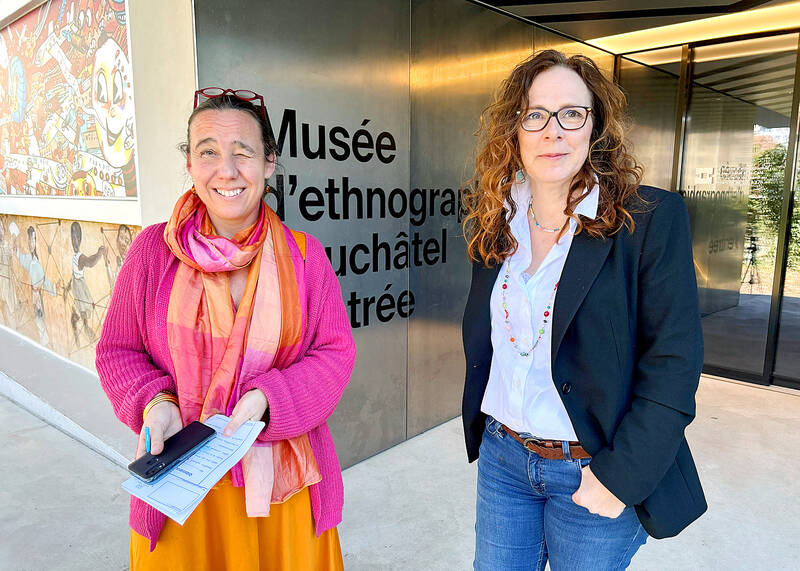The world’s woes got you down? Feeling burnout at work? Need a little something extra to fight illness or prep for surgery? The Swiss town of Neuchatel is offering its residents a novel medical option: Expose yourself to art and get a doctor’s note to do it for free.
Under a new two-year pilot project, local and regional authorities are covering the costs of “museum prescriptions” issued by doctors who believe their patients could benefit from visits to any of the town’s four museums as part of their treatment.
The project is based on a 2019 World Health Organization report that found the arts can boost mental health, reduce the impact of trauma and lower the risk of cognitive decline, frailty and “premature mortality,” among other upsides.

Photo: AP
Art can help relax the mind — as a sort of preventative medicine — and visits to museums require getting up and out of the house with physical activity like walking and standing for long periods.
Neuchatel council member Julie Courcier Delafontaine said the COVID crisis also played a role in the program’s genesis. “With the closure of cultural sites (during coronavirus lockdowns), people realized just how much we need them to feel better.”
She said so far some 500 prescriptions have been distributed to doctors around town and the program costs “very little.” Ten thousand Swiss francs (about US$11,300) have been budgeted for it.
If successful, local officials could expand the program to other artistic activities like theater or dance, Courcier Delafontaine said. The Swiss national health care system doesn’t cover “culture as a means of therapy,” but she hopes it might one day, if the results are positive enough.
Marianne de Reynier Nevsky, the cultural mediation manager in the town of 46,000 who helped devise the program, said it built on a similar idea rolled out at the Fine Arts Museum in Montreal, Canada, in 2019.
She said many types of patients could benefit.
“It could be a person with depression, a person who has trouble walking, a person with a chronic illness,” she said near a display of a feather headdress from Papua New Guinea at the Ethnographic Museum of Neuchatel, a converted former villa that overlooks Late Neuchatel.
Part of the idea is to get recalcitrant patients out of the house and walking more.
Dr. Marc-Olivier Sauvain, head of surgery at the Neuchatel Hospital Network, said he had already prescribed museum visits to two patients to help them get in better shape before a planned operation.
He said a wider rollout is planned once a control group is set up. For his practice, the focus will be on patients who admit that they’ve lost the habit of going out. He wants them to get moving.
“It’s wishful thinking to think that telling them to go walk or go for a stroll to improve their fitness level before surgery” will work, Sauvain said on a video call Saturday, wearing blue scrubs. “I think that these patients will fully benefit from museum prescriptions. We’ll give them a chance to get physical and intellectual exercise.”
“And as a doctor, it’s really nice to prescribe museum visits rather than medicines or tests that patients don’t enjoy,” he added. “To tell them ’It’s a medical order that instructs you to go visit one of our nice city museums.’”
Some museum-goers see the upsides too.
“I think it’s a great idea,” said Carla Fragniere Filliger, a poet and retired teacher, during a visit to the ethnography museum. “There should be prescriptions for all the museums in the world!”

Google unveiled an artificial intelligence tool Wednesday that its scientists said would help unravel the mysteries of the human genome — and could one day lead to new treatments for diseases. The deep learning model AlphaGenome was hailed by outside researchers as a “breakthrough” that would let scientists study and even simulate the roots of difficult-to-treat genetic diseases. While the first complete map of the human genome in 2003 “gave us the book of life, reading it remained a challenge,” Pushmeet Kohli, vice president of research at Google DeepMind, told journalists. “We have the text,” he said, which is a sequence of

On a harsh winter afternoon last month, 2,000 protesters marched and chanted slogans such as “CCP out” and “Korea for Koreans” in Seoul’s popular Gangnam District. Participants — mostly students — wore caps printed with the Chinese characters for “exterminate communism” (滅共) and held banners reading “Heaven will destroy the Chinese Communist Party” (天滅中共). During the march, Park Jun-young, the leader of the protest organizer “Free University,” a conservative youth movement, who was on a hunger strike, collapsed after delivering a speech in sub-zero temperatures and was later hospitalized. Several protesters shaved their heads at the end of the demonstration. A

In August of 1949 American journalist Darrell Berrigan toured occupied Formosa and on Aug. 13 published “Should We Grab Formosa?” in the Saturday Evening Post. Berrigan, cataloguing the numerous horrors of corruption and looting the occupying Republic of China (ROC) was inflicting on the locals, advocated outright annexation of Taiwan by the US. He contended the islanders would welcome that. Berrigan also observed that the islanders were planning another revolt, and wrote of their “island nationalism.” The US position on Taiwan was well known there, and islanders, he said, had told him of US official statements that Taiwan had not

We have reached the point where, on any given day, it has become shocking if nothing shocking is happening in the news. This is especially true of Taiwan, which is in the crosshairs of the Chinese Communist Party (CCP), uniquely vulnerable to events happening in the US and Japan and where domestic politics has turned toxic and self-destructive. There are big forces at play far beyond our ability to control them. Feelings of helplessness are no joke and can lead to serious health issues. It should come as no surprise that a Strategic Market Research report is predicting a Compound